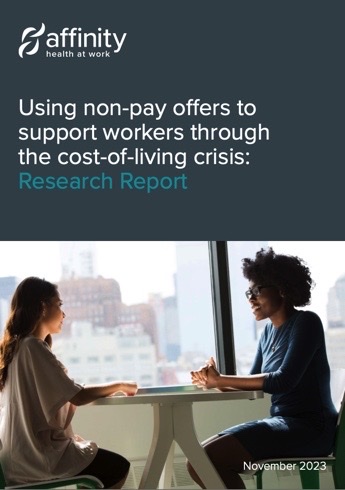Supporting employees with non-pay offers through the cost-of-living crisis
The 'cost-of-living crisis', defined as the fall in 'real' disposable income that the UK has been experiencing since late 2021 is having a profound impact on the nation. Inflation reached a 40 year high in October 2022 (ONS, 2022a) and the fiscal year 2022-23 saw the biggest one-year fall in living standards since records began in 1956-57, with a further reduction in living standards forecast for 2023-24 (Office for Budget Responsibility).
Given that 47% of employees are experiencing financial worries (CIPD), supporting workers through this crisis is not only the right thing to do, but important for business outcomes such as the reduction of employee absence and turnover, and for the preservation of engagement and productivity. For many organisations however, supporting employees through pay incentives is difficult or untenable. Therefore, together with Affinity's Research Consortium, we took an evidence-based approach, gathering data from employees, stakeholders and policy leads to understand how employees can be best supported through non-pay offers during the crisis.
Download this report to learn about:
- Examples of non-pay offers found to be beneficial to employees
- Non-pay offers that employees would like to have access to or receive
- Barriers and facilitators in providing non-pay offers
- Recommendations for supporting employees through the cost-of-living crisis and beyond
For more information about this research or how we can support your organisation, please contact us on hello@affinityhealthatwork.com
Supporting employees with non-pay offers through the cost-of-living crisis
- Date Published
- Wed, 8th Nov 2023
- Publisher
- Affinity Health at Work
- Categories
- Keywords
- HR, Wellbeing Outcomes, Mental Health, Leadership, Job Design, Job Crafting, Strategy Development
The 'cost-of-living crisis', defined as the fall in 'real' disposable income that the UK has been experiencing since late 2021 is having a profound impact on the nation. Inflation reached a 40 year high in October 2022 (ONS, 2022a) and the fiscal year 2022-23 saw the biggest one-year fall in living standards since records began in 1956-57, with a further reduction in living standards forecast for 2023-24 (Office for Budget Responsibility).
Given that 47% of employees are experiencing financial worries (CIPD), supporting workers through this crisis is not only the right thing to do, but important for business outcomes such as the reduction of employee absence and turnover, and for the preservation of engagement and productivity. For many organisations however, supporting employees through pay incentives is difficult or untenable. Therefore, together with Affinity's Research Consortium, we took an evidence-based approach, gathering data from employees, stakeholders and policy leads to understand how employees can be best supported through non-pay offers during the crisis.
Download this report to learn about:
- Examples of non-pay offers found to be beneficial to employees
- Non-pay offers that employees would like to have access to or receive
- Barriers and facilitators in providing non-pay offers
- Recommendations for supporting employees through the cost-of-living crisis and beyond
For more information about this research or how we can support your organisation, please contact us on hello@affinityhealthatwork.com


